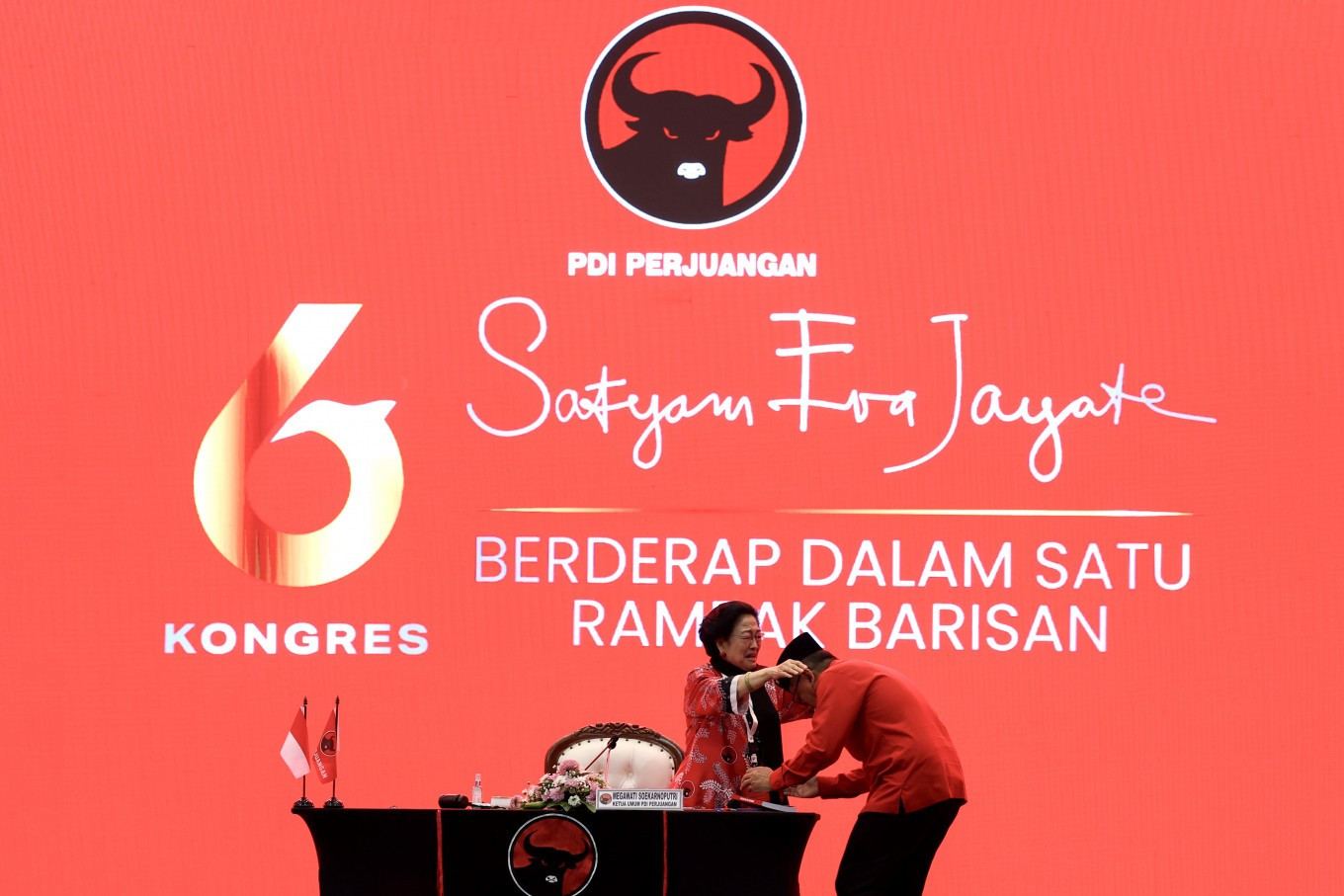News
PDI-P’s nebulous stance risks it becoming in-between party
Tenggara Strategics August 13, 2025 'Ideological party': Indonesian Democratic Party of Struggle (PDI-P) chairwoman Megawati Soekarnoputri welcomes secretary-general Hasto Kristiyanto on Saturday before the closing session of the party's congress in Nusa Dua, Bali. Just days before his appearance in the congress, Hasto, who was convicted of bribery on July 25, received amnesty from President Prabowo Subianto. (Antara/Monang Sinaga)
'Ideological party': Indonesian Democratic Party of Struggle (PDI-P) chairwoman Megawati Soekarnoputri welcomes secretary-general Hasto Kristiyanto on Saturday before the closing session of the party's congress in Nusa Dua, Bali. Just days before his appearance in the congress, Hasto, who was convicted of bribery on July 25, received amnesty from President Prabowo Subianto. (Antara/Monang Sinaga)
The Indonesian Democratic Party of Struggle (PDI-P) continues to be ambivalent in its stance toward President Prabowo Subianto ’s administration, with party matriarch Megawati Soekarnputri declaring it is neither part of the coalition government nor in the opposition role.
The PDI-P, which came first in the last three general elections, is torn between the two poles. The party’s two-day congress from Aug. 1 in Bali did not settle the question and instead sowed confusion among its rank and file, which could undermine its leading position in the 2029 elections.
Megawati’s flip-flopping statements at the congress did not help, either. In opening remarks immediately after she was reappointed the party chair by acclamation, she instructed her party to support the Prabowo administration. But in her closing statement, she declared the PDI-P would settle in the role of a “balancer” and would not be joining the ruling coalition, leaving party officials to explain and articulate what this means over the next few days.
The PDI-P is the only political party out of the eight with seats in the House of Representatives that is not part of the coalition government, although it has a long-standing invitation from Prabowo to join, which would entitle it to some cabinet posts. The party won the 2024 legislative election, but its candidate Ganjar Pranowo lost the presidential race.
The congress was already delayed by several months as the party awaited the outcome of the corruption trial of its former secretary-general Hasto Kristiyanto, as well as to see whether the President would lend his support. The congress went ahead the day after Prabowo granted amnesty to Hasto on July 31, just a week following his conviction for bribing electoral officials in 2019.
Prabowo’s gesture was obviously not good enough for Megawati, who has yet to return the ball in her court. Rumors say the deal fell through over how many and which cabinet positions were on offer. As the largest party in the House, the PDI-P refuses to be a junior partner in the government. On the other hand, those parties that have been supporting Prabowo throughout are likely to protest if the PDI-P is given a greater number of positions.
Prabowo’s big-tent coalition might have all but one House faction, but it also counts on the support of almost all major special interest groups, including Muslim organizations, businesses, the military and the police. Meanwhile the PDI-P has 110 House seats, or 16.7 percent, which is hardly enough to be a balancing factor against the formidable force of the Prabowo administration.
The outcome of its national congress also reflects a deep division within the PDI-P, both political and familial. The camp led by House Speaker Puan Maharani, who is also Megawati’s daughter, favors joining the government. The other is led by Prananda Prabowo, Megawati’s son from her first marriage, and has taken a hard-line stance against the current administration. It is also a contest about who will succeed Megawati, now 78 and clearly ailing.
The congress showed, however, that she is clearly still in charge and has the sole power to appoint the party’s top jobs, filling the central executive board with mostly old faces. She also holds the job of secretary-general after Hasto was deposed, at least for now.
Still, joining the government is not without risk. One upside is that doing so will provide the PDI-P with access to power and money to launch its bid in the next elections, which is the primary reason why all other parties rushed to join the “grand coalition” after Prabowo won the 2024 election. The downside is that this will restrict the party from openly criticizing government policies, even if it disagrees with them.
The PDI-P has played both roles. It was the main opposition from 2004 to 2014 during the two-term presidency of Susilo Bambang Yudhoyono, and handled the job so well it sustained its leading position in the elections, always ranking among the top two parties. And it led the ruling coalition from 2014 to 2024 under president Joko “Jokowi” Widodo, who was a card-carrying member until their inimical split over his decision to back Prabowo and not Ganjar in last year’s election.
It remains to be seen how well the PDI-P handles the role of “balancer” and whether it can sustain its current position as the largest political party until the 2029 general election.
What we've heard
A PDI-P politician said the amnesty granted to Hasto would not affect the party’s independence in responding to Prabowo’s government policies. According to the source, PDI-P will speak out against any deviations it observes. This stance, the politician said, has already been evident in several parliamentary meetings with the government.

